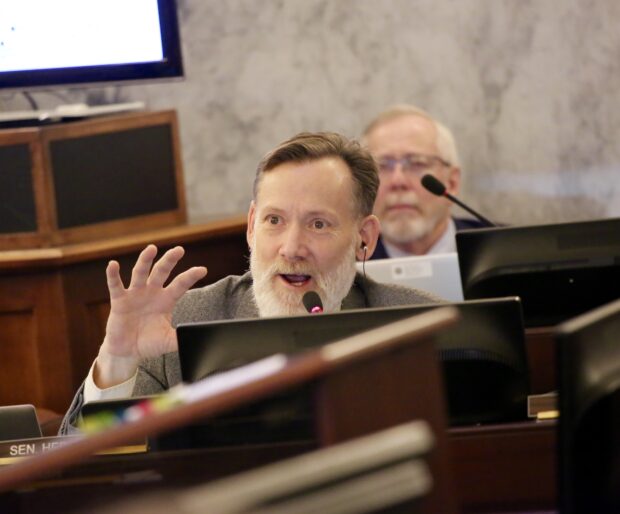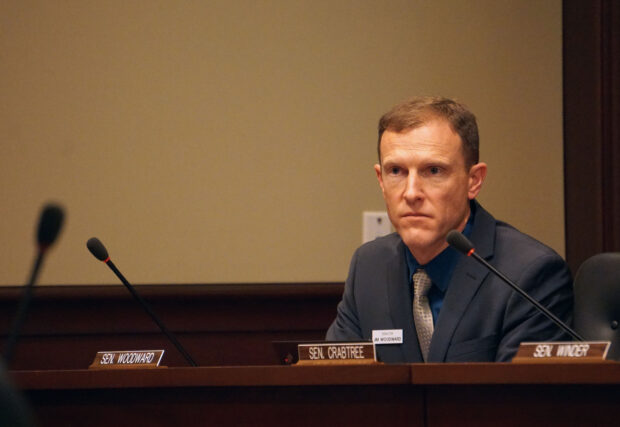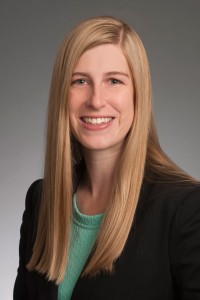There are 25 shopping days until Christmas and 173 check-cutting days until the Idaho primary.
And some well-heeled donors are beating the rush, pouring tens of thousands of dollars into legislative races, even though candidates cannot begin filing for office until March 4. And for those who don’t live and breathe Idaho politics, the May 21 primary seems far off in the future.
The early money knows what’s on the line. This primary represents the next bitter, high-stakes showdown between mainstream and hardline Republicans — for control of the Legislature and, perhaps, even control of the Idaho GOP. At its essence, it’s a debate over the proper role of government, in education, infrastructure and tax policy. And after 2022, when a handful of legislative primaries carried six-figure price tags, the cost of Idaho politics is clearly climbing.
“It’s a different level of intensity than we’ve seen in past cycles,” said Sean Schupack, director of government affairs for Idaho Associated General Contractors. “The game’s changing.”
Who is giving money — and why
In this game, campaign finance reports provide a ton of statistics.
For now, legislative campaigns need only report $1,000 donations — the maximum an individual or a business can contribute. More detailed annual reports, listing smaller donations, won’t come in until early next year.
These sunshine report snapshots still tell an important piece of the story. After hardline conservatives gained ground in the 2022 primaries, especially in the Senate, some big PACs are pushing back. Some of the biggest and busiest donors have largely supported mainstream Republicans and a handful of Democrats:
- Clearwater Paper, based in Spokane, Wash., has contributed to 48 legislators and legislative candidates. The company hasn’t been as active in Idaho elections in recent years, and is playing catchup this time around, communications director Julia Angelen Joy said Thursday.
- The Idaho Association of Realtors has contributed to 33 candidates.
- BNSF railway, headquartered in Fort Worth, Texas, has contributed to 16 candidates.
The money isn’t just flowing from businesses and PACs.
Richard Larsen runs a hay farm based in Dubois in Clark County, Idaho’s most sparsely populated county. His political reach has long extended beyond rural Eastern Idaho; he said he has contributed to Republicans “since Bill Clinton got elected.” And he said he will support next year’s Republican presidential nominee, whoever that turns out to be.
In the meantime, Larsen and his wife Peggy have contributed more than $100,000 to Idaho candidates and PACs, including more than two dozen GOP legislative candidates. Larsen, who describes himself as a conservative Republican, is putting money behind candidates who will be squaring off against hardline opposition. After watching “the radical right-wing libertarian people” seize control of the Republican Party, he says he’s never been involved in a more important election.
“We’re just trying to get our party back and save what we’ve got,” he said.
Meanwhile, hardline incumbents and challengers are working their own base of financial support. SMC Properties of Eagle has given maximum $1,000 donations to eight candidates; its owner, North Carolina metals dealer Stefan Gleason, has doubled down with an additional $1,000 contribution to former state Sen. Christy Zito, R-Hammett. Idaho Falls law firm Smith, Driscoll and Associates — and attorney Bryan Smith, an Idaho Freedom Foundation board member and GOP national committee member — have given maximum donations to six conservatives.
Where the money is going
Idaho’s northernmost legislative district is a battleground in the GOP’s internal war — and a bellwether for a costly election cycle.

Incumbent Sen. Scott Herndon, R-Sagle, already has reported $19,000 in contributions, including $1,000 apiece from SMC Properties and Smith, Driscoll and Associates. Former state Sen. Jim Woodward, ousted by Herndon in the 2022 primary, has reported $32,000, including $1,000 from Clearwater Paper, $1,000 from Richard Larsen and $1,000 from Peggy Larsen. (Woodward has also beefed up his war chest with a $20,000 loan.)
Considering that Herndon and Woodward spent nearly $215,000 in the months leading up to their 2022 election, a big-money rematch is all but preordained. And the outcome could have a significant impact on education policy. Herndon is one of several hardliners on the Senate Education Committee and one of the most conservative members of the budget-writing Joint Finance-Appropriations Committee, having replaced Woodward on both committees.

Fundraising is also off to a quick start in several other primaries that could have profound implications for education:
- In another rematch involving a Senate Education hardliner, Nampa Republican Sen. Brian Lenney has raised $6,000, including $1,000 from Smith. Former Sen. Jeff Agenbroad, defeated by Lenney in 2022, has raised $5,000, including support from Clearwater Paper and the Larsens.
- Bolstered by donations from AGC, the Larsens and Clearwater Paper, Middleton Republican Lori Bishop has $32,000 on hand, as she takes on Sen. Tammy Nichols, R-Middleton, a Senate Education hardliner and an ardent school choice advocate. Bishop’s early war chest includes a $25,000 to her campaign. Nichols has reported $2,000 in donations, including $1,000 from Freedom Foundation board member Doyle Beck.
- Senate Education vice chairman Benjamin Toews has loaned his campaign $40,000, even though no opponent appears to be raising money to challenge the Coeur d’Alene Republican.
- House Education Committee Chairwoman Julie Yamamoto has reported $8,000 in donations; her likely primary opponent, fellow Caldwell Republican Kent Marmon, has raised $3,000. Yamamoto is under fire from the right — partly because her committee stymied school choice legislation in 2023, and partly because she opposed a bill that would have banned libraries from distributing “harmful” materials to minors.
- Yamamoto’s committee vice chair and political ally, Lori McCann, R-Lewiston, has raised $6,000. And McCann already has two opponents raising money ahead of the GOP primary; Moscow Republicans David Dalby and Colton Bennett have raised $2,000 and $1,000, respectively.
Why now?
The fundraising arms race will continue — and intensify — between now and May. That’s an outgrowth of Idaho law. While some states prohibit lawmakers from fundraising during a legislative session, Idaho has no such ban.

But Boise State University political science professor Jaclyn Kettler says the early fundraising push should come as little surprise. Candidates and their supporters have ample incentive to start out fast. An early infusion of money can discourage some would-be opponents from jumping into the race. And fundraising tends to feed on itself, helping candidates attract support from other direct donors. It can also help candidates catch the eye of third-party groups that can put unlimited money into campaigns.
“There is some suggestion, particularly for primary elections, that these early donations can help establish the viability of candidates,” Kettler said.
That’s long been the strategy for Avista, a Spokane-based utility that has so far supported 10 legislative incumbents, including McCann. The utility tends to endorse incumbents — and well ahead of the May primaries. “We haven’t really diverted from this methodology,” said Jared Webley, Avista’s communications manager.
AGC, meanwhile, is consciously speeding up its calendar.
AGC has sent maximum $1,000 donations to Bishop and five other candidates, and will likely send our more checks in December, Schupack said. Generally, AGC tries to get donations out before the session begins in January — but now, the group wants to help candidates get ahead of bitter primaries and a potential surge of out-of-state money.
“The earlier you provide resources to good candidates, the more effectively those resources can be deployed,” he said.
The primary may be 173 days away, but this long election has started early.
Kevin Richert writes a weekly analysis on education policy and education politics. Look for his stories each Thursday.
